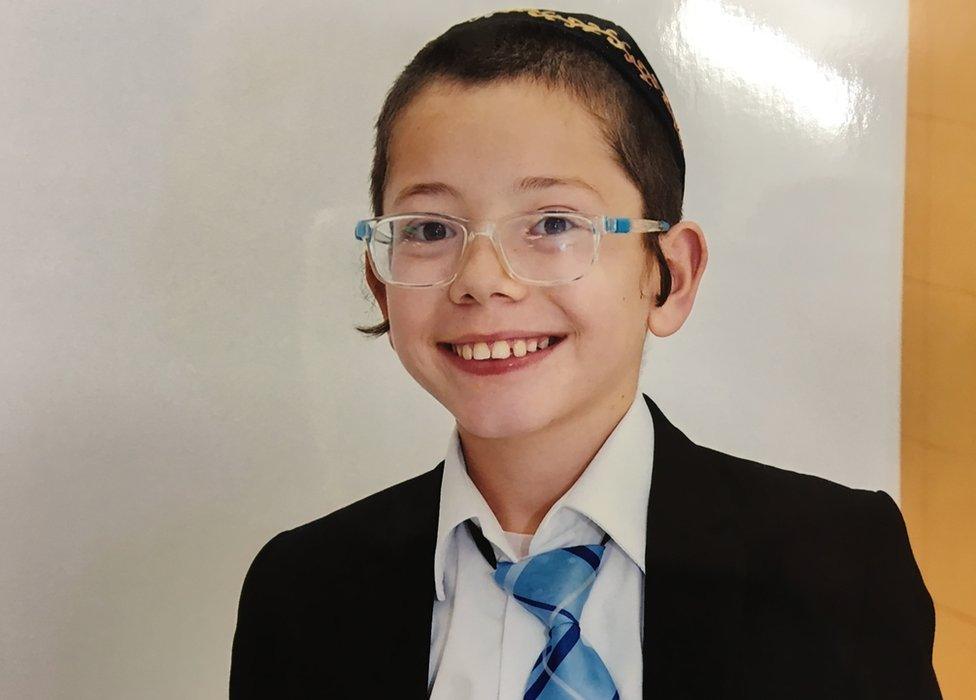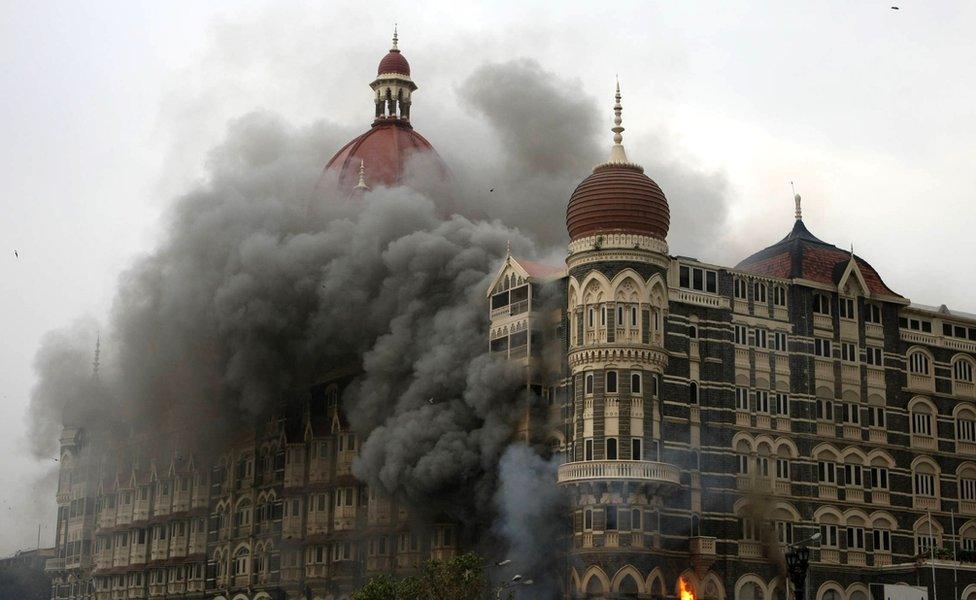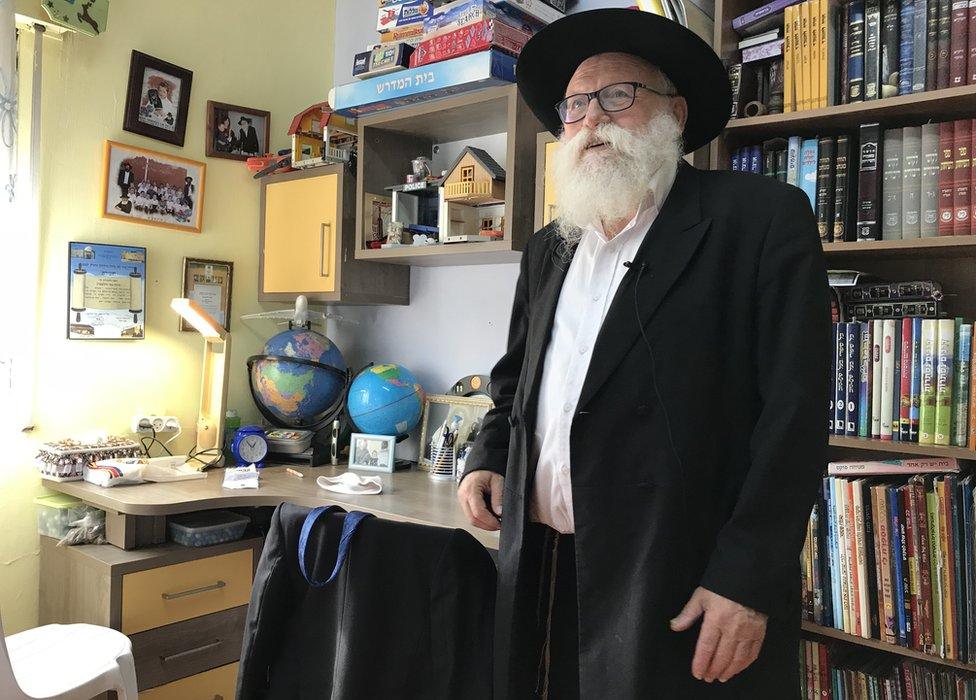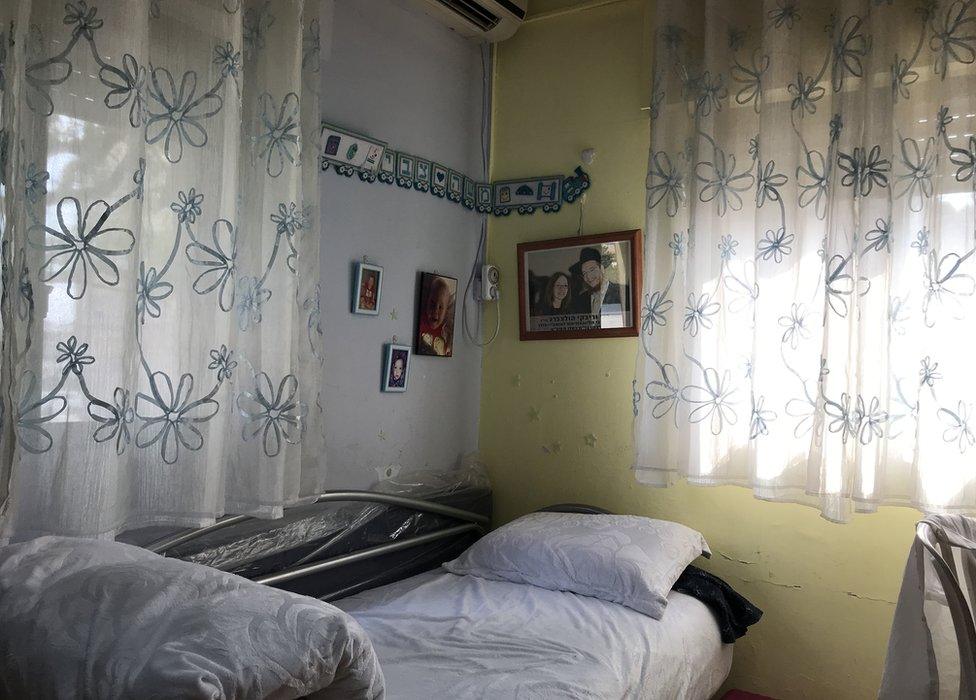Moshe Holtzberg: The Israeli boy who survived 2008 Mumbai attack
- Published

Moshe Holtzberg was two years old when his parents were killed
One of the most evocative stories from the Mumbai attacks is that of the Israeli toddler saved by his Indian nanny as gunmen killed both his parents. He is now set to revisit the site of the attack with Prime Minister Benjamin Netanyahu. BBC Hindi's Zubair Ahmed met his family in Israel.
Every night before going to bed, 11-year-old Moshe Holtzberg looks up at the photo of his smiling parents hanging above his bed and wishes them good night.
Gabi and Rivka Holtzberg were killed in Chabad House, a Jewish cultural centre in the western Indian city of Mumbai, during a deadly attack in 2008. Moshe was barely two years old at the time.
He now lives in the Israeli city of Afula with his maternal grandparents. He misses his parents, says his grandfather, Rabbi Rosenberg. He knows how they died, he adds.
The safety and comfort that surrounds Moshe at his grandparents' home is in sharp contrast to the violence that orphaned him nearly 10 years ago.
The 60-hour siege of India's financial capital was one of the worst terror attacks on Indian soil and claimed the lives of 166 people. Nine gunmen also died. Mohammad Ajmal Amir Qasab, the sole surviving gunman, was arrested and tried, before being executed in 2012.
India blamed Pakistan-based militant group Lashkar-e-Taiba for the attacks.

Gunmen targeted seven different locations, including the Taj Mahal hotel
The gunmen carried out a series of co-ordinated attacks across Mumbai targeting seven different locations, including two luxury hotels, the main railway station and the Jewish centre where the Holtzbergs had been living.
Moshe was saved by his nanny, Sandra Samuel, who said she found him standing over the unconscious bodies of his parents. She is believed to have grabbed him and fled outside.
It remains unclear what Moshe witnessed but, according to his family, he suffered nightmares for months and had trouble sleeping, external.
The BBC was unable to meet Moshe because Mr Rosenberg says the psychologist has advised that he be shielded from the media.
But he spoke at length about his grandson, whom he affectionately calls "Moshe boy".

Rabbi Rosenberg dotes on his grandson, whom he calls "Moshe boy"
"Moshe boy has been asking about the Chabad House and about India," Mr Rosenberg says. "He is quite excited."
Moshe, along with his grandparents and Ms Samuel are part of the delegation of Israeli Prime Minister Benjamin Netanyahu who is on an official four-day visit.
This will be Moshe's first time in India since the attack. It will be an emotional journey, Mr Rosenberg says.
Moshe was invited by Indian Prime Minister Narendra Modi who had met the boy during his visit to Israel in July.
Moshe is expected to spend time with Mr Netanyahu at the centre where his parents were killed.
"Moshe boy will show him [Mr Netanyahu] around. He will take him to his room," said Mr Rosenberg.
In Moshe's room in Afula there are two globes on his study table. "Moshe boy is a keen student of geography and mathematics," Mr Rosenberg says with pride.
Mr Rosenberg dotes on Moshe but, he says, it took a long time to bond with his grandson.
"When we brought him here, he would cry during the day and at night. He would ask 'where is my papa, where is my mama'."
Instead, he would cling to Ms Samuel.
"Initially, he wouldn't come to me," says Mr Rosenberg. "Maybe because I wore black clothes and the terrorists had a black mask."
But he didn't give up. He bought two bicycles, one for Moshe and one for himself, and the two of them would go cycling together.

A photo of Moshe's parents hangs above his bed
Gradually, they built a relationship.
"I took him to places he would be interested in. I felt I had become young again," says Mr Rosenberg.
And he says Ms Samuel helped a lot, too. The Rosenbergs helped her get Israeli citizenship and she now lives in Jerusalem, a two-hour drive from Afula.
She works elsewhere but spends weekends with Moshe and his family. "She is family," Mr Rosenberg says.
"If she is late, Moshe boy becomes anxious. He picks up the phone and calls her to ask why she is late."
Moshe, according to his grandfather, wants to be a rabbi like his father, Gabi.
His parents had moved to Mumbai seven years before the attack to work at Chabad House. Their life in Mumbai had revolved around Jewish people visiting the city and other parts of India.
Moshe is likely to follow in their footsteps.
"He is too little now. But when he is older he might like to go to Mumbai and work at the Chabad House," says Mr Rosenberg, who is already readying Moshe for that role.